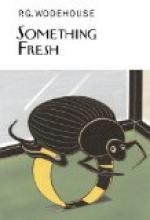In English trains the tipping classes travel first; valets, lady’s maids, footmen, nurses, and head stillroom maids, second; and housemaids, grooms, and minor and inferior stillroom maids, third. But for these social distinctions, the whole fabric of society would collapse and anarchy stalk naked through the land—as in the United States.
Ashe was feeling remarkably light-hearted. He wished he had not bought Joan that magazine and thus deprived himself temporarily of the pleasure of her conversation; but that was the only flaw in his happiness. With the starting of the train, which might be considered the formal and official beginning of the delicate and dangerous enterprise on which he had embarked, he had definitely come to the conclusion that the life adventurous was the life for him. He had frequently suspected this to be the case, but it had required the actual experiment to bring certainty.
Almost more than physical courage, the ideal adventurer needs a certain lively inquisitiveness, the quality of not being content to mind his own affairs; and in Ashe this quality was highly developed. From boyhood up he had always been interested in things that were none of his business. And it is just that attribute which the modern young man, as a rule, so sadly lacks.
The modern young man may do adventurous things if they are thrust on him; but left to himself he will edge away uncomfortably and look in the other direction when the goddess of adventure smiles at him. Training and tradition alike pluck at his sleeve and urge him not to risk making himself ridiculous. And from sheer horror of laying himself open to the charge of not minding his own business he falls into a stolid disregard of all that is out of the ordinary and exciting. He tells himself that the shriek from the lonely house he passed just now was only the high note of some amateur songstress, and that the maiden in distress whom he saw pursued by the ruffian with a knife was merely earning the salary paid her by some motion-picture firm. And he proceeds on his way, looking neither to left nor right.
Ashe had none of this degenerate coyness toward adventure. Though born within easy distance of Boston and deposited by circumstances in London, he possessed, nevertheless, to a remarkable degree, that quality so essentially the property of the New Yorker—the quality known, for want of a more polished word, as rubber. It is true that it had needed the eloquence of Joan Valentine to stir him from his groove; but that was because he was also lazy. He loved new sights and new experiences. Yes; he was happy. The rattle of the train shaped itself into a lively march. He told himself that he had found the right occupation for a young man in the Spring.
Joan, meantime, intrenched behind her magazine, was also busy with her thoughts. She was not reading the magazine; she held it before her as a protection, knowing that if she laid it down Ashe would begin to talk. And just at present she had no desire for conversation. She, like Ashe, was contemplating the immediate future, but, unlike him, was not doing so with much pleasure. She was regretting heartily that she had not resisted the temptation to uplift this young man and wishing that she had left him to wallow in the slothful peace in which she had found him.




